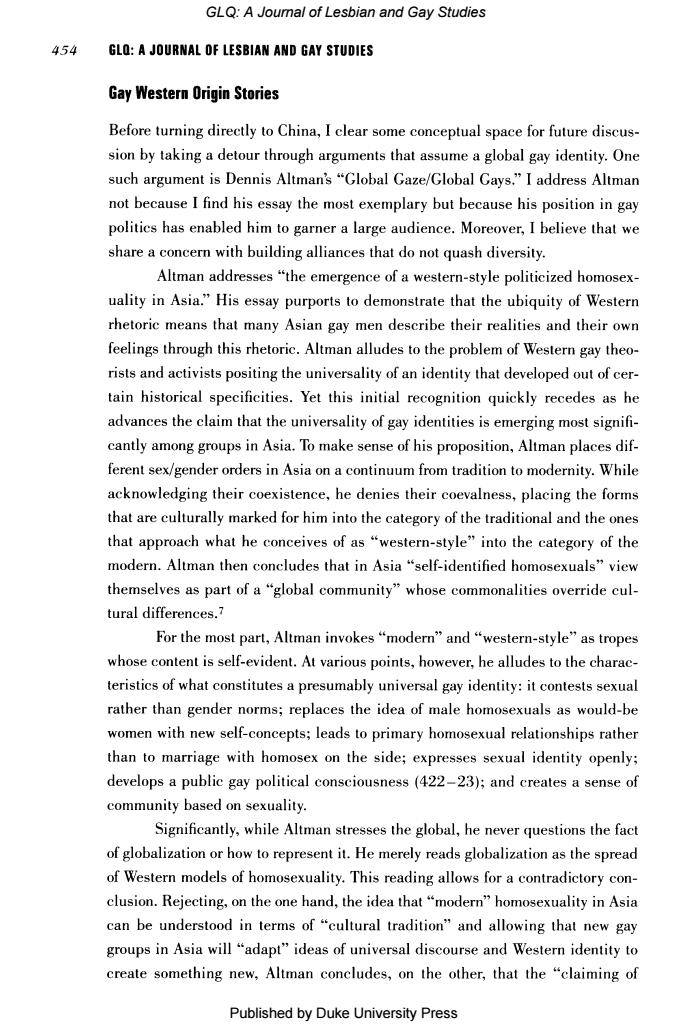正在加载图片...

GLQ:A Joumal of Lesbian and Gay Studies 454 GLO:A JOURNAL OF LESBIAN AND GAY STUDIES Gay Western Origin Stories Before turning directly to China,I clear some conceptual space for future discus- sion by taking a detour through arguments that assume a global gay identity.One such argument is Dennis Altman's"Global Gaze/Global Gays."I address Altman not because I find his essay the most exemplary but because his position in gay politics has enabled him to garner a large audience.Moreover,I believe that we share a concern with building alliances that do not quash diversity. Altman addresses"the emergence of a western-style politicized homosex- uality in Asia"His essay purports to demonstrate that the ubiquity of Western rhetoric means that many Asian gay men describe their realities and their own feelings through this rhetoric.Altman alludes to the problem of Western gay theo- rists and activists positing the universality of an identity that developed out of cer- tain historical specificities.Yet this initial recognition quickly recedes as he advances the claim that the universality of gay identities is emerging most signifi- cantly among groups in Asia.To make sense of his proposition,Altman places dif- ferent sex/gender orders in Asia on a continuum from tradition to modernity.While acknowledging their coexistence,he denies their coevalness,placing the forms that are culturally marked for him into the category of the traditional and the ones that approach what he conceives of as "western-style"into the category of the modern.Altman then concludes that in Asia"self-identified homosexuals"view themselves as part of a"global community"whose commonalities override cul- tural differences.7 For the most part,.Altman invokes“modern'”and“western-style'”as tropes whose content is self-evident.At various points,however,he alludes to the charac- teristics of what constitutes a presumably universal gay identity:it contests sexual rather than gender norms;replaces the idea of male homosexuals as would-be women with new self-concepts;leads to primary homosexual relationships rather than to marriage with homosex on the side;expresses sexual identity openly; develops a public gay political consciousness(422-23);and creates a sense of community based on sexuality. Significantly,while Altman stresses the global,he never questions the fact of globalization or how to represent it.He merely reads globalization as the spread of Western models of homosexuality.This reading allows for a contradictory con- clusion.Rejecting,on the one hand,the idea that"modern"homosexuality in Asia can be understood in terms of"cultural tradition"and allowing that new gay groups in Asia will "adapt"ideas of universal discourse and Western identity to create something new,Altman concludes,on the other,that the "claiming of Published by Duke University Press454 GLQ: A JOURNAL OF LESBIAN AND GAY STUDIES Gay Western Origin Stories Before turning directly to China, I clear some conceptual space for future discussion by taking a detour through arguments that assume a global gay identity. One such argument is Dennis Altman’s “Global Gaze/Global Gays.” I address Altman not because I find his essay the most exemplary but because his position in gay politics has enabled him to garner a large audience. Moreover, I believe that we share a concern with building alliances that do not quash diversity. Altman addresses “the emergence of a western-style politicized homosexuality in Asia.” His essay purports to demonstrate that the ubiquity of Western rhetoric means that many Asian gay men describe their realities and their own feelings through this rhetoric. Altman alludes to the problem of Western gay theorists and activists positing the universality of an identity that developed out of certain historical specificities. Yet this initial recognition quickly recedes as he advances the claim that the universality of gay identities is emerging most significantly among groups in Asia. To make sense of his proposition, Altman places different sex/gender orders in Asia on a continuum from tradition to modernity. While acknowledging their coexistence, he denies their coevalness, placing the forms that are culturally marked for him into the category of the traditional and the ones that approach what he conceives of as “western-style” into the category of the modern. Altman then concludes that in Asia “self-identified homosexuals” view themselves as part of a “global community” whose commonalities override cultural differences.7 For the most part, Altman invokes “modern” and “western-style” as tropes whose content is self-evident. At various points, however, he alludes to the characteristics of what constitutes a presumably universal gay identity: it contests sexual rather than gender norms; replaces the idea of male homosexuals as would-be women with new self-concepts; leads to primary homosexual relationships rather than to marriage with homosex on the side; expresses sexual identity openly; develops a public gay political consciousness (422-23); and creates a sense of community based on sexuality. Significantly, while Altman stresses the global, he never questions the fact of globalization or how to represent it. He merely reads globalization as the spread of Western models of homosexuality. This reading allows for a contradictory conclusion. Rejecting, on the one hand, the idea that “modern” homosexuality in Asia can be understood in terms of “cultural tradition” and allowing that new gay groups in Asia will “adapt” ideas of universal discourse and Western identity to create something new, Altman concludes, on the other, that the “claiming of GLQ: A Journal of Lesbian and Gay Studies Published by Duke University Press